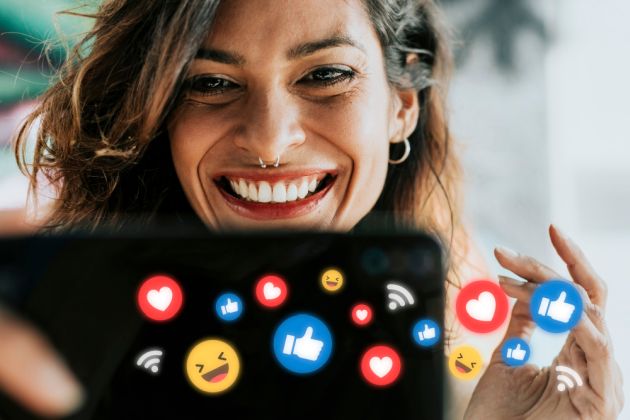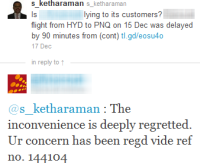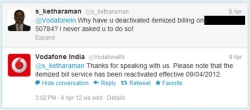Around the end of 2009, my HP OfficeJet printer broke down. I logged a call with the local office of Hewlett Packard’s service partner. I got no response for three days. I gave up with the vendor’s local office and decided to escalate my complaint to its head office. Thankfully, the company’s Vice President for Business Development happened to be one of my LinkedIn connections. I sent him a quick message explaining my problem. He apologized on behalf of his local office and immediately connected me to his company’s Vice President – Service. From there, it was relatively smooth sailing all along. Long story short, I continue to be a happy user of this printer three years later.
This was my first taste of using social media for customer service.
Fast forward to six months ago.
I was flying back from Hyderabad to Pune (for the uninitiated, these are two Indian cities located 800 kms apart). My flight was delayed. Just before boarding the aircraft, I found out the real reason for the delay (check out my post Games Airlines Play to know what really happened). Since the truth differed drastically from the airline’s official version announced over the airport’s PA system, I was quite ticked off. Just before powering off my mobile phone in preparation for takeoff, I sent off a quick tweet expressing my displeasure at the airline’s misleading communications. As I was collecting my baggage at Pune airport one and a half hours later, I received a call from the airline following up on my tweet. Its representative told me that there was a genuine internal confusion about the cause of the delay and assured me that the airline didn’t have any intention to mislead its passengers. Over the next two days, the airline communicated with me via Twitter and email – when 140 characters didn’t suffice – and cleared the confusion.
After this experience, I was convinced about the power of social media driven customer service and decided to turn to Twitter / Facebook whenever I needed to get something done with any of my service providers – at least those who do have a social media presence and take it seriously.
A couple of months ago, I had an issue with a certain bank and needed to contact its customer service. Normally, I’d have had to log on to its Internet Banking portal, visit the Contact Us page, click on two or three drop down menus to select the nature of my query / request / complaint (QRC). Often, I wouldn’t have found anything fitting my situation and would’ve been forced to contort my brain cells heavily enough before I was eventually able to select one of the available alternatives. With my new found faith in social media powered service, I decided to ditch Internet Banking altogether. I simply posted my question on the bank’s Facebook Wall. In the time it’d have taken me to log a ticket on the bank’s website had I chosen that channel, I actually got a reply to my FB post (see my post Pushing The Envelope On Adopting Cutting Edge Technology – Part 2 for the full FB newsfeed) and the matter was closed. This was an exhilarating experience, unparalleled by web, telephone or any other channel with the possible exception of branch.
I’ve subsequently reached out to many other companies – in high-tech, insurance and telecommunications industries – via Twitter and Facebook and my experience has been uniformly positive.
Therefore, I’m convinced that social media is the best thing that happened to customer service since, er, nothing else (not call center, for sure!).
For now, I don’t see any flipside for consumers with this channel. So, I’m going to declare “customers of the world unite behind social media customer service, you have nothing to lose but the call center hold music”.
I do recognize that not all types of service requests (e.g. account balance) are suited for social media. Besides, banks and other service providers might ask, “what’s in it for us?” while providing social media customer service. If that question is not satisfactorily answered, they might pull the plug on this channel, citing budget, ROI or compliance-related reasons. Since I’d hate to see that happening, I’ll write another post covering a few areas of benefits of providing service via social media for service providers (Spoiler Alert: Call centers and websites apparently suck at cross-selling and upselling).


